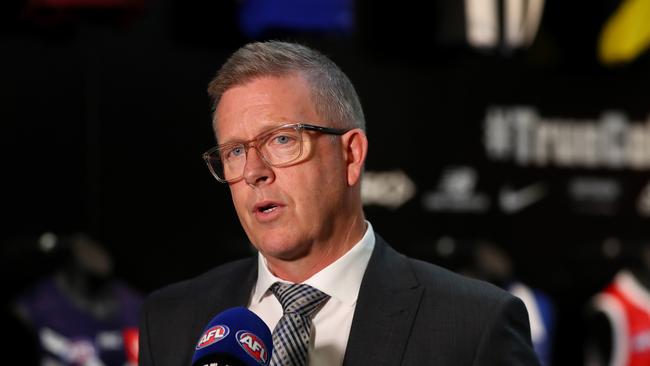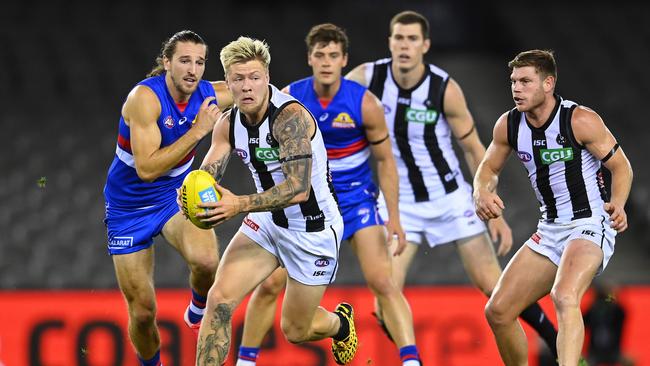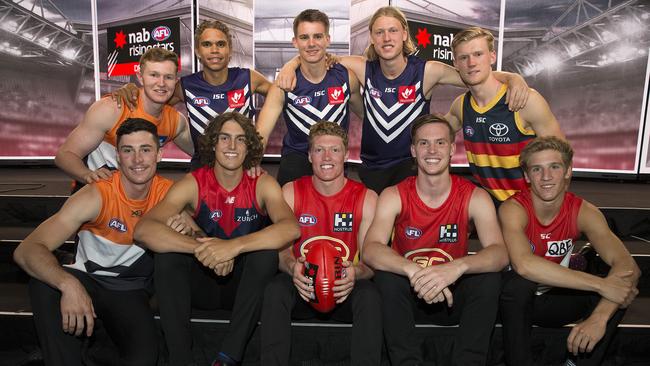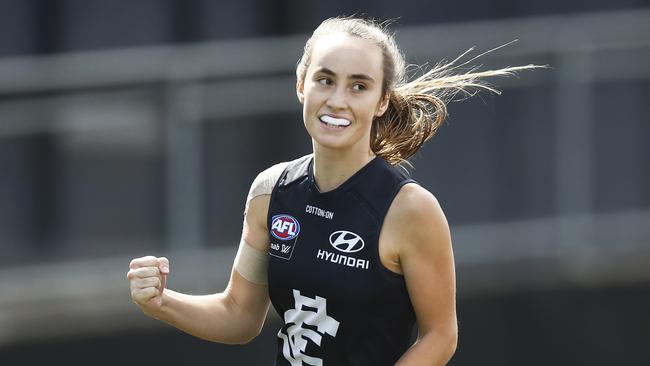AFL football operations boss Steve Hocking speaks about the uncertain season ahead
The AFL says it is still planning for a May 31 restart, but will soon need to decide whether it can happen. Mark Robinson puts the key questions to league football boss Steve Hocking.

AFL News
Don't miss out on the headlines from AFL News. Followed categories will be added to My News.
AFL football operations boss Steve Hocking had an in-depth chat with chief football writer Mark Robinson about the coronavirus affected season ahead.
They covered all bases including season contingency plans, the future of the AFLW list sizes, the, state-league and local competitions and more.
FULL Q&A BETWEEN ROBBO AND STEVE HOCKING
Mark Robinson: How many different scenarios have you explored for this season? I’ve been told there is up to 10.
Steve Hocking: There’s at least 10. There’s certainly a range of things we’re working through and one of the difficult things is we can’t get too far ahead because we need to keep step and keep working with government and medical advice around that. But, yes, there’s a lot on the table.
MR: It’s increasingly unlikely May 31 will be the date when football returns and those scenarios include the competition starting in either June, July or August. Is there one scenario you’re more confident than not of being played out?
SH: No. We’ve got 144 games that we’re committed to. There’s a lot of work being done by the fixturing team led by Travis Auld and Marcus King, and with the broadcasters. There’s a lot of work in that space and then that starts to underpin how you move forward. And I come back to government and medical, you can’t race too far ahead because they are really important parts as we work through this.

MR: Do you agree May 31 is unlikely?
SH: That’s the mark we’ve got at the moment and from here, the last week of April will be where that is reconsidered. We’re not in a position to say otherwise.
MR: So, there’s scenarios for the season starting on May 31, and scenarios for June, July and August?
SH: Yes. But again with those scenarios, no one has any understanding if any of those will come to life at this stage. It’s just future planning we need to take to get away the 144 games and finals.
YOU DECIDE! 100 games from the past 50 years to choose from: Vote for your favourite by clicking here: Polling closes 8pm, Tuesday
MR: Everyone is hoping the season starts at some stage. Are you hopeful or more confident than that?
SH: We’ve got a lot of confidence. If you go back to Round 1 and the uncertainty leading into Round 1, we got because the whole industry was united. And getting out of the blocks allowed us to gain a lot of insight, such as rules and some of the changes we made for the season, knowing the season may need to be compressed at some stage. We’ve got oversight of that now. That has helped the industry, particularly for coaches, GMs of footy, high performance and players. They’ve got a lot more certainty knowing integrity is being looked after.
MR: The NRL is discussing at length a proposal to isolate teams in one town or city to play matches. An AFL CEO spit balled the possibility of three groups of six teams doing the same. Is that on the ‘’could be’’ list?
SH: It’s one of the things we’re working through with the clubs. We’ve been working closely with the GMs of football, the coaches and high performance managers, holding meetings every couple of days. Some of those meetings are updates, but there’s also progressing conversations. What I will say is we’ve been fortunate this industry has lived on certainty and been quite rigid, but we’re on new ground here now. The pleasing thing which has come through from the clubs is just how innovative we could be with the remaining part of 2020.
MR: How many contingency plans have been discussed about the timing of and whereabouts of the Grand Final?
SH: There’s not a lot. We’re committed to 144 games, that’s where we want to get to.
MR: The AFL is not talking about rounds anymore, it’s all about 144 matches, why is that?
SH: We need everybody to understand it’s 144 games which we want to get done and just get everybody focused on that. Clearly, we’ve got nine games away, so from here, it’s keeping people motivated and focused what’s ahead – 144 is the focus.

MR: Which would allow you, when footy returns, to stage double-headers, triple headers, playing week nights, and which could see some teams perhaps playing nine games as opposed to another team playing six game at any given time?
SH: If you have a look at what we did for Round 1, we shortened game times, we kept rotations at 90, we put extra time between a goal being scored and the next bounce. All of that was to look after the players’ health and wellbeing, ensure we’re not overloading them and actually have the whole competition starting out in an equal race, and the integrity of the game was looked after. They were done ahead of time, knowing at some point we’d have to compress the season.
MR: Let’s talk national draft. Could the number of selections be reduced, and possibly have no rookie selections this year? Where is the draft situated?
SH: One of the challenges is there’s not under age footy in this point of time, so ideally we get games in for those youngsters and all the clubs have the opportunity to look at the potentials. But we don’t know if that’s going to happen. The draft is part of a big moving piece and we’re considering how does that all work. I think that reflects a lot of the season. Whoever ends up winning the premiership this year, it’s going to be one of the toughest years. I don’t understand the asterisk being talked about. It’s going to be a tough year to win the premiership and the same could be applied to drafting players.

MORE AFL NEWS:
My Story: Essendon defender Michael Hurley opens up on his rollercoaster career
Fears AFL financial struggles could kill off future footy fairytales, like Marlion Pickett
MR: How does this year effect next year? By that I mean, if this season finishes in December, do you anticipate next year starting at its usual date, about March 20?
SH: A lot of the work we’ve done with GMs, coaches and high performance managers over the past couple of weeks is, whenever we do get started, we’re only talking about a three-week mini pre-season. No practice matches as well. To answer your question about next year, and we don’t want to get too far ahead of ourselves, but if you’re playing into December they will have completed some of their pre-season and that will have been in games.
MR: The strong suggestion is the soft cap will reduced by $3 million to $6 million next year. Has that been locked in or is it possible it could be reduced even further?
SH: We’ve got a number of CEOs working through potential scenarios and there’s a working group internally working on a host of things. The reason for that is, where does all of the state league, all the second-tiers, where does the under-age and where does the community pieces fit into it all? They are critical elements for us. We’ve got to support the recovery and sustainability of all tiers of football. Part of that links into what the soft cap looks like and that’s a broader piece of work which will take some months to work through and understand. But we are absolutely committed to making sure that ecosystem is strong moving forward.
MR: Clearly, the city and country clubs and leagues are looking at the AFL for guidance.
SH: This will be a major call out for us. We have to look after the long-term future of the AFL and so many ecosystems live off that. I can’t overstate this enough, it’s so critical to the long-term future of football that all of those areas are healthy. We don’t have a game without those layers underneath.
MR: Was talking to an official from one of the Essendon district clubs on Friday and he fears for the club’s future. He wondered if there could be one season of football without player payments. Could you see something as drastic as that happening?
SH: I’m not sure it needs to be that drastic, but we’re committed to doing the work which is required to support all those different competitions.
MR: Memberships might not be your area of expertise, but right now clubs are asking their members to stick fat. Would the AFL reward that loyalty by, say, announcing the members of the two teams playing in next year’s Grand Final will be given greater access to tickets and that corporates will be cut back?
SH: Everyone is important in this game. The contribution the fans make you can certainly put a measure on that after Round 1. A lot of us recognise how important they are. But so are all the corporates as well. Their involvement and sponsorship of the game enables us to do so much through so many different levels of the game. It’s really important through this current climate we don’t put groups up against other groups. The reality is every single person contributes over and above and we thank everybody for that. The corporates and commercial partners do so much, such as the NAB sponsorship through the under age, it’s so significant.
MR: We want to talk about list sizes next year, which ties in with the second-tier competition and my understanding is clubs want VFL teams. Are you closer to deciding on the list size model?
SH: We’re not. A lot of that will take a lot of stakeholder engagement to progress, if that’s the direction (cut lists) we choose to take. The stakeholder piece is clearly the AFLPA. There’s a lot of work to be done there. What does it mean to the players if that’s the direction we go? If it did happen in the future, how long does it take to get there? The second part is, are the second-tier and the state leagues supporting that type of direction as well?
MR: So, if list are cut to 35 and there’s no VFL teams, where do the players play if they don’t get a senior game?
SH: Potentially, what would need to happen is you’d have this vertical movement model.
MR: Which is what?
SH: If you have a look at what we did with the mid-season draft last year, that’s vertical movement. You’ve got players coming out of state leagues coming into AFL.
MR: So, the players would go back to various state leagues?
SH: Potentially. That’s an example of one thing you’d have to work through as to how you capture those players not selected.
MR: It would appear there will be a state league next year.
SH: I reckon I’ve been pretty clear on how important state leagues are. They are super important to the future of the game.
MR: It was reported clubs were worried they might not be able to field AFLW teams next year because of cost cutting. Can you guarantee there will be 14 teams in the women’s comp next year?
SH: Gil’s on record saying there will be 18 mens teams next year and it will be the same for the 14 women’s teams.

Originally published as AFL football operations boss Steve Hocking speaks about the uncertain season ahead
